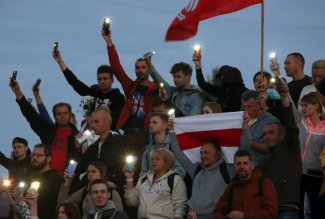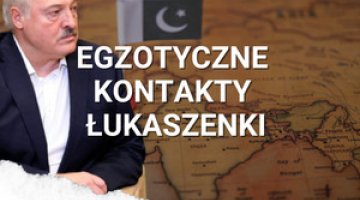Protests in Belarus: government’s efforts to de-escalate the situation

All of the demonstrations that took place on were Thursday were entirely peaceful. They took the forms of living ‘solidarity chains’, marches of groups of demonstrators along city streets and pickets in front of detention centres. The protests once again spilled over to dozens of district cities and regional towns (and even some villages). They began early in the morning and were much more numerous than on Wednesday. The almost complete absence of law enforcement agencies and merely isolated acts of violence from traffic police aided this.
Unlike in the previous days, the number of strike actions increased, including at large state-owned factories (the fertiliser manufacturer GrodnoAzot and the plastic yarn manufacturer Khimvolokno, both based in Hrodna, and the heavy vehicle manufacturer Belaz based in Zhodzina). Workers met with local government representatives and local police superintendants as part of the strike. Some of the workers also took to the streets after work (for example, the workers of GrodnoAzot and Khimvolokno), which additionally strengthened the demonstrators in these cities. In Zhodzina near Minsk, as a result of pressure from workers in the Belaz factory, thousands of people gathered at a rally in the city centre, which was also attended by the mayor and the head of the local prosecution authorities. Citizens openly stated their demands during the rally, accusing the local elites of tolerating violence from law enforcement agencies. At the same time, none of the workers decided to discontinue work permanently, although they warned that this scenario was possible, if their demands were ignored, for example, those concerning a vote recount. Representatives of numerous cultural institutions, hospitals and national railways also manifested their protest against the government’s activity. An increasing number of demonstrators who have been released from mass detention are providing increasingly dramatic accounts concerning the extremely brutal measures used at detention centres.
A gradual change has been seen in the government’s actions and narrative with regard to the protesting opponents of the regime. The Minister of Internal Affairs, Yury Karayeu, in an interview for state television, claimed responsibility for all injuries sustained by random individuals during the post-election demonstrations. He also assured that the authorities would not use violence against those protests taking the form of solidarity chains. In turn, the deputy Minister of Internal Affairs, Alyaksandr Barsukou, declared that all demonstrators would be released from detention by the morning of 14 August. Similar conciliatory statements accompanied by apologies were also heard yesterday from representatives of the lower ranks of the nomenklatura. This is a sign that the regime has adopted a new narrative. Subsequently, Lukashenka’s confidante, Natalia Kachanava, who serves as the speaker of the Council of the Republic (the upper house of parliament), informed that the president had taken into consideration the “opinions of factory workers” and ordered the circumstances behind the dramatic events of the past few days to be cleared up. She also added that the government did not want a “war” and, as a token of its peaceful intentions, announced the release of over 1,000 protestors detained on Thursday. Lukashenka did not respond personally to any of the demonstrators’ demands on that day.
More and more state media journalists, police officers and even presidential administration staff are quitting their jobs. At the same time, the state news agency Belta, presented a recording of statements given by one of the coordinators of Sviatlana Tsikhanouskaya’s campaign (who had previously worked for Viktor Babaryka, currently in detention), who admitted that he had been paid to provoke riots after the election and that he had allegedly received orders from Moscow-based political analysts linked to the Russian government.
Commentary
- The events on Thursday showed Belarusians’ great potential for expressing civil protest based on the belief that they have the right to be treated with respect and to peacefully defend their interests. During the meetings with local nomenklatura, people openly presented their demands, insisting, for example, on recounting the votes and releasing the detained. Thus, we can see a process of rapid civil emancipation and a growing sense of dignity, which have less and less in common with the standards of an authoritarian regime. An important factor fuelling the determination of the Belarusian public is the widescale evidence of brutal tortures used against the demonstrators at detention centres that are being revealed on a massive scale. It is expected that the protests, in the form of peaceful ‘solidarity chains’ and worker rallies, will be continued on 14 August.
- The government clearly wants a de-escalation of social tension, fearing an outbreak of an industrial general strike. If thousands of workers took to the streets across Belarus, this would not only pose a serious challenge to law enforcement forces but would also come as a serious indictment of the propaganda thesis, based on Soviet traditions which hold that the government takes special care of workers. Other major factors that have forced the government to take a more conciliatory stance include the increasing number of protesters, the resignations over the past two days, and the scale of protests throughout the country, which is too large for the law enforcement agencies to cope with. Another important factor is that fresh reserves of both OMON security forces and internal troops are being depleted. If the regular army, which is still waiting in the wings, was engaged to support the internal troops, this might only add fuel to the fires.
- By entrusting his closest aides, Kachanava and Karayeu, with the difficult mission of easing the public outrage, Lukashenka has shown for the first time since the protests started that he is beginning to understand how serious the situation is. Reducing tension among workers will be a priority. Therefore, promises of increasing social benefits and wages cannot be ruled out. Show trials of a few representatives of the law enforcement sector on charges of abuse of power and cruel treatment of the detained during the pacification measures may also be held. However, the increasingly frequent demands for the election to be held again, or a recounting of the votes, are unlikely to be met. At the same time, the thesis of “external interference” in the election process will continue to be developed. Given the present condition of public sentiment, this is not only an anachronism from a previous epoch but also a manifestation of arrogance. Furthermore, the government’s efforts to de-escalate the situation may be thwarted as a result of the expected announcement of the final election results by the Central Election Commission.





